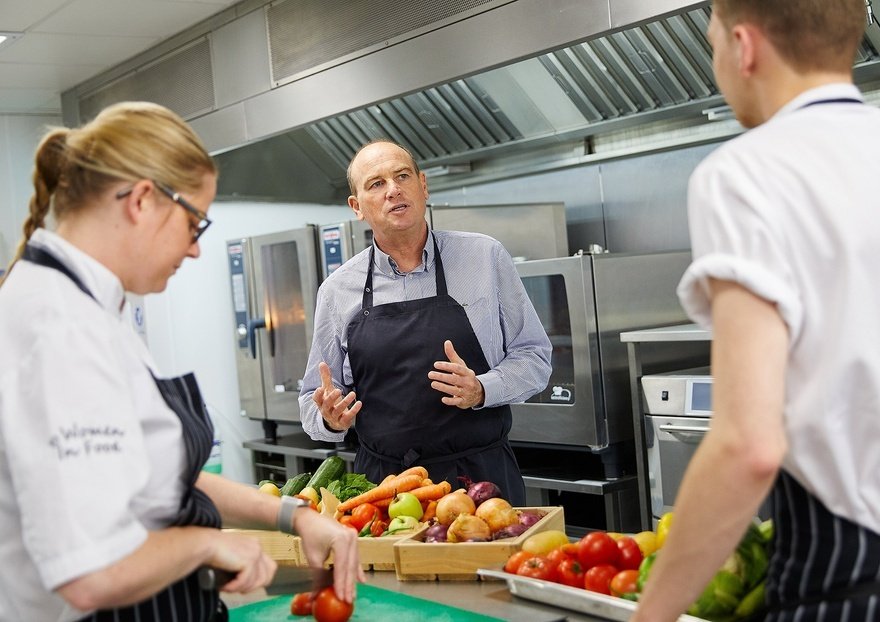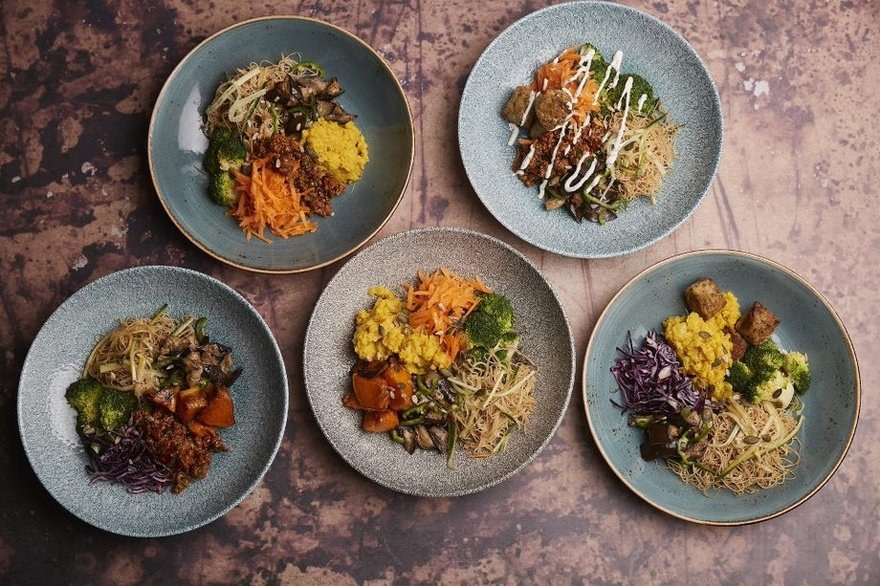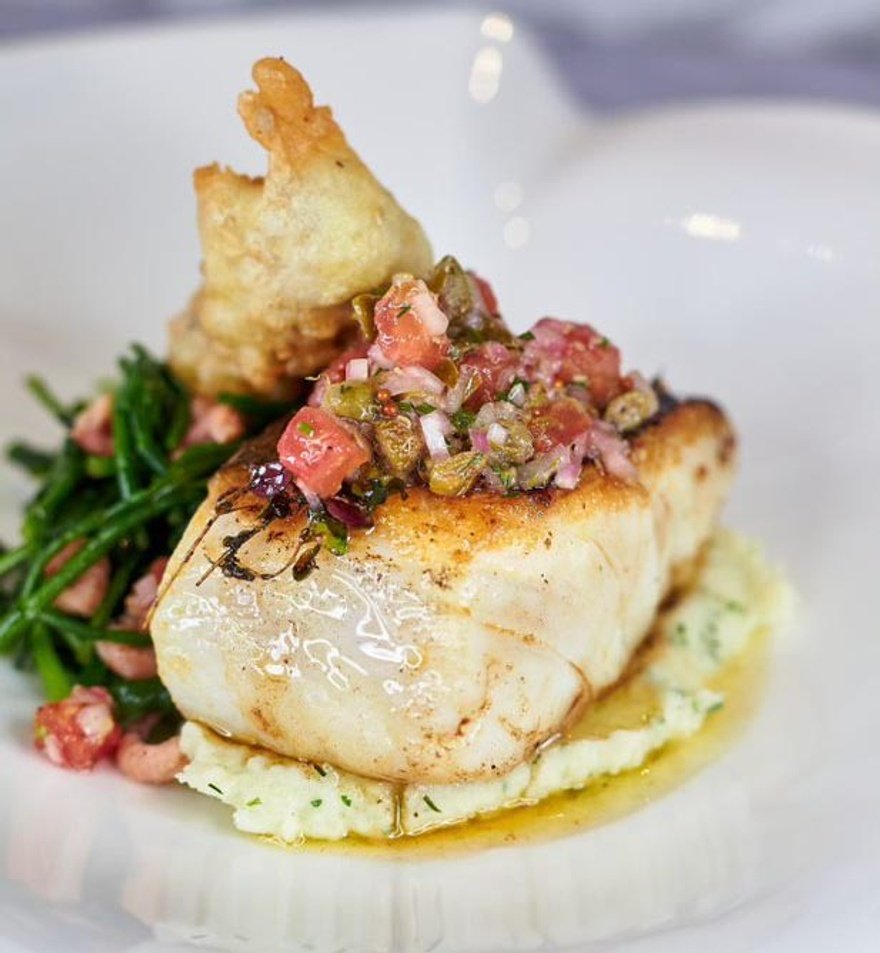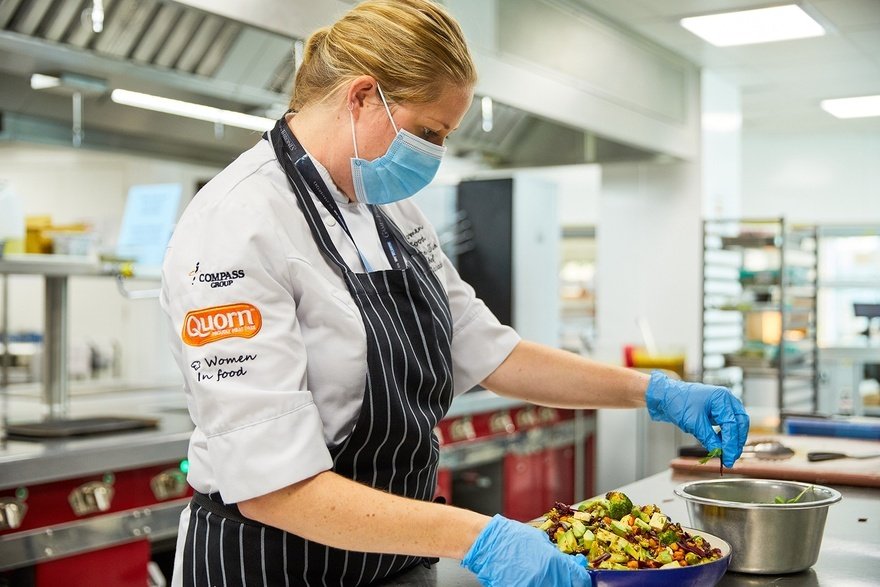Compass UK & Ireland's Robin Mills on building a business fit for the changing world of work
The pandemic gave pause to the managing director of Compass Group UK and Ireland's plans, but no matter: the foodservice giant is now revved up and ready for launch, with a raft of client improvements. Caroline Baldwin reports.
You took on the role of managing director of UK and Ireland halfway through the pandemic. How did that affect you and the business?
We're a diverse business in that we're in all sectors of foodservice, from sport to schools, hospitals, oil rigs and universities. So when Covid hit we had some sectors that were full-on, like hospitals and defence, while other sectors essentially closed.
One thing we did early on was move all our people who worked in sport into hospitals – they rushed in to do extra cleaning, extra services, extra weekends – they worked through the night.
In the early days nobody had control; we were basically pouring people into sites and relying on the quality of those people and the systems they were using. I thought we needed some principals to guide us because no one had seen anything like this before. We decided it was all about looking after our people, about never skipping a beat on supporting the NHS, and then it was about looking after the business.
In the early days when those decisions were coming at us, and they were moral, financial, client-based and personal – like when people were trying to buy toilet rolls – it was the complexity of how to pick our way through it. Having a set of principles helped to guide us. We then started forecasting – of course, the forecasts were wrong, but it gave us something to plan against.
What was going through your mind at the time?
It dawned on me pretty quickly that this was a once in a career-lifetime chance to build the business I've always wanted. And I had some talented people who suddenly had some bandwidth and I had some choices to make. Clearly there were many conversations with clients to fix contracts, but then I realised that there was quite a lot of opportunity, too.
I'm very passionate about the real living wage and during lockdown we became an accredited provider. We had time to fix some pay rates that were out of kilter, we gave more money to employees working in the health service, upgraded our labour scheduling approach, and we also spent time researching our net zero ambitions and doing a lot more work on the digital side.
Suddenly, I realised I could get so much done, and once those things became embedded, when the business does come back, it will be integral, rather than bolting it onto the sides.
What have you learned about yourself over the course of the pandemic?
I'm pretty resilient, but I probably knew that already. I think I see opportunity more than threat, and we're obviously an industry in transition and change brings opportunity. I felt an enormous personal responsibility for the team, for the people at the front line, and for the industry.
I felt an enormous personal responsibility for the team, for the people at the front line, and for the industry
You've spoken highly of the people you employ and you have held previous roles as HR director and chief people officer. What have you learned from these roles that you have taken into the role of managing director?
Chief people officer – I still can't bring myself to say that phrase, but that's what they used to call me. To be a chief people officer or HR director, you've got to have an inherent belief that the quality of your people is a competitive difference and that your culture is a competitive difference. You've really got to believe that getting the best people and engaging with them is what makes you win. If you believe that as an HR director, I think you believe it even more as a managing director. Of course, our business is entirely people- based. If we shut tomorrow, there's no factories or weeks' worth of stock, just our people.
You've recently devolved parts of your business to Wales and Scotland. Why was that important?
We were already heading in the direction of employing locally, and we like local supply chains and working with local providers, so it made a lot of sense. We felt as though we could contribute more to local communities and environments if we presented ourselves in a more local, joined-up way. And frankly, we thought we could win more contracts.
We appointed managing directors of Scotland and Wales. I wanted to give them space to build relationships and make an industry impact. Another key part of the formula is that apprenticeship schemes run differently in Scotland and Wales.
And how are you feeling about the business from a trading perspective – has the delay to ‘freedom day' hit the business hard?
We're sort of at the margins we would have been pre-Covid by now. We're not in revenues – we're about three-quarters of where we were before, but the way I feel is that on every level it's a much better business.
The work has been done, so we're more flexible and we fixed some of the cost-based, contractional, legacy infrastructure of the past, and we've got digital initiatives, which means we can flex labour up and down. We're in really good shape and performing well against a reduced revenue.
Talk to us more about your digital innovations.
There were trends emerging before Covid, but the pandemic allowed us to finish their development and get them bedded in. We bought food tech start-up Feedr the weekend before lockdown, so there was already digital investment knocking around inside Compass.
Our priority with technology is to make it central so that everybody has a digital offer when they speak to their clients, rather than tech just being a bolt-on. It's more integral to the food offer with innovations like pre-order, click and collect and deliver-to-desk. We're also rolling out walk-in, walk-out retail sites like the Amazon Go store – the first one will be in defence.
Are you concerned about the working from home trend and how it might affect office catering?
I'm getting a bit bored of the "are they coming back to the office?" narrative, because you can put any client on the spectrum; some can't wait to get their workforce back in and others are not coming back until September or even January. We're still trying to make sense of it and there tends to be two groups: the more cautious, planning group who like to manage every single detail, from telling employees how many and which days they can come in and even where they're going to sit, and another group who are saying ‘we can't wait to have you all back, we're better together'.
How do you even begin to plan to service those two very different business mindsets?
From a food perspective they both work well. For the planners, we know how many people to cater for and that they're probably going to pre-order, and this is great for waste and labour scheduling. The others want to use their food offer to incentivise people to come back and they want food to be more central to collaboration. After that it's just a matter of timing.
We're at the stage now where we've got every- thing we need: we can pre-order digitally, and we can dial up the food offers. Now we just have to be agile and entrepreneurial to see how it unfolds. This whole situation has put food even further up the agenda as part of the employee offer. It will all end up being about how can we attract better people than our competitors – the war for talent – which means the offer of both experience and food will be central to that.
You were also the managing director of Chartwells, which took a reputation hit earlier this year when a free school meals bag was criticised and went viral on social media. What have you done since then to regain some of that trust?
The context of that was the government was opening and then shutting schools and it really put the supply chain under pressure. We had an operational failure, there's no getting away from it. Nevertheless, we took it on the chin, provided free food for a period of time and provided free breakfast during half-term.
It hasn't really hit us in terms of clients. We've recently won school catering for Anglesey and Isle of Wight, and if you know Chartwells by reputation, you know it was a blip. We had a really good sales year at Chartwells, but it made us look closely at our operation and we invested in the back-end and other areas. Since then we're doing 1.6 million meals a week, so the control is back. But they were hairy times, absolutely.
How's the sporting sector looking?
We're in the middle of Wimbledon and we're using that and other test events to figure out what the sporting sector will look like. The delay to 21 June is a bit inconvenient, but it's not the end of the world. It's not unhelpful that these things come back in steps – imagine Tottenham going from zero spectators to 64,000 for the Arsenal game, whereas zero to 10,000 helps everyone get back in the game.
It's not unhelpful that these things come back in steps – imagine Tottenham going from zero spectators to 64,000 for the Arsenal game, whereas zero to 10,000 helps everyone get back in the game
At an international test match at Edgbaston, which took place at 70% capacity with 18,000 people a day across 10-14 June, people ate and drank more than the average at an event pre-Covid. People definitely want to come out and treat themselves.
You've made a big commitment to the environment, publishing your intentions to reach net-zero greenhouse gas emissions by 2030. How did this come about?
This has been a conversation in Compass since I arrived. Some clients are now starting to talk about their own net zero commitments, as well as customers, and we're right in the centre of that.
Where it really began was in our chef competitions, which for the past two or three years have included at least one plant-based course, and we ask for descriptions of the supply chain of the food they are using, with marks given for seasonal and local produce. It's all been bubbling up and I and a few others thought there was an opportunity to really crystalise it – it's about our responsibility as an industry leader.
We had some external research done as we need science-based targets and we wanted to get it properly measured; it's strategic and well thought-through. I thought if we get this right, we can influence both sides – we can say to buyers that we need to know not just where your meat comes from, but where your feed comes from. In regard to air miles, we want to look if we can cut air freight out entirely and just use local, seasonal produce. And then we go to the client and say, ‘we can help you build a net-zero plan, and we can make your food climate-neutral over the period of the contract'. Those conversations since our announcement have really started in earnest.
And how do you plan to meet this goal?
It's going to be a journey. The first stage is to reduce, and, come the middle of the decade we're going to look at how we offset, such as investing in regenerative farming. The way I see it is that Compass works on behalf of the industry and will become part of the circle rather than the end of the chain.
The way I see it is that Compass works on behalf of the industry and will become part of the circle rather than the end of the chain
Being at the heart of a sustainable circular systems means even better food, a better supply chain and better quality ingredients. I feel very positive because it doesn't feel like I'm fighting anything: everything is in line in terms of health, local, seasonal, British – they're all heading in the same direction.
Compass numbers
Operating locations Over 6,000
Latest contract wins Royal Mail, Imperial War Museum, Anglesey County Council, Watford FC, Newbury Racecourse and HM Naval Base Clyde
Number of employees 45,000
80% of food sourced within the UK
80% of supply chain is made up of SMEs
Photography: 2021 Douglas Kurn
Continue reading
You need to be a premium member to view this. Subscribe from just 99p per week.
Already subscribed? Log In














